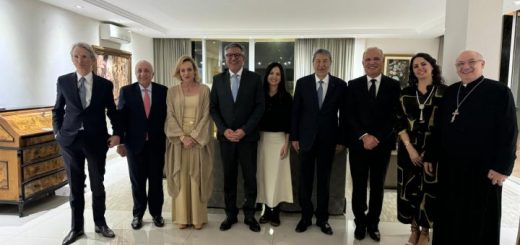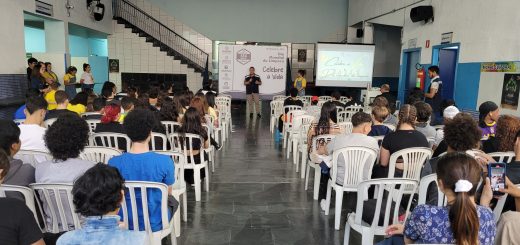FAMBRAS and the World Council Promote International Seminar on Islamic Dialogue and Cultures in Latin America
FAMBRAS – the Federation of Muslim Associations of Brazil, in partnership with the World Council of Muslim Communities – an international organization headquartered in the United Arab Emirates that works to promote Islam as a religion of peace, civilization, and coexistence, strengthening Muslim communities in minority contexts – organized the First International Seminar Islamic Dialogues between Cultures: Brazil, Latin America, and the Arab World. The event brought together experts in religion, culture, and society in three thematic panels, which addressed experiences of coexistence, social solidarity, and interfaith cooperation. The objective was to strengthen intercultural dialogue and promote a deeper understanding of Islamic values in the Latin American context.
On the first day of the seminar, the opening session featured the participation of FAMBRAS President Ali Zoghbi; the Secretary-General of the World Council of Muslim Communities, Mohammed Bechari; and the Council’s Deputy Secretary, Omar Albreiki.
“This seminar has a unique importance for all of Latin America, as it invites us to reflect on experiences of peaceful and collaborative coexistence between Muslims and non-Muslims, rooted in the richness of our cultural identities. It is an opportunity to broaden the understanding of Islamic values and to show the world what Islam truly is,” explained Ali Zoghbi.
During his remarks at the opening, Mohammed Bechari highlighted the spiritual and transformative dimension of the gathering. “Our conference today is not merely a virtual dialogue, but a practical materialization of the words of the Almighty revealed in Surah Al-Ma’idah, verse 2: ‘And help one another in virtue and piety.’” He added that the occasion symbolizes a new beginning: “Let us make this meeting the starting point of a new path, one that transforms coexistence into cooperation, diversity into constructive energy, and dialogue into a shared human covenant.”
Omar Albreiki emphasized the significance of interfaith and intercultural seminars as instruments to strengthen coexistence and mutual understanding. In his words, “what confers upon this gathering a truly unique character is the alignment of visions, the clarity of the proposed objectives, and the harmonious combination between religious reference and cultural legitimacy.”
Panel 1 addressed the theme Islam and Cultural Identities in Latin America: Successful Experiences of Affective Coexistence, with contributions from Paulo Hilu, Professor of Anthropology at Fluminense Federal University (UFF); Fabiola Oliveira, communicator and digital influencer; and Sheikh Antar Elashry – Head of the Egyptian Awqaf Mission in Brazil. The discussion highlighted the plurality of Muslim presence in the region and the possibilities of harmonious coexistence with other faiths and cultures.
Panel 2, on the theme Islamic Values and Principles for Combating Poverty and Achieving Social Solidarity, featured Ali Zoghbi, who presented the Islamic foundations of solidarity and FAMBRAS’s social initiatives; Sálua Omáis, psychologist, writer, and founder-director of the Psicoislam group, who addressed the psychological and spiritual dimensions of caring for others; and digital influencer and rapper Sharif Shabazz, who shared personal experiences on the impact of solidarity in his life journey.
The third and final panel focused on Religious Coexistence in Latin America: From Dialogue to Cooperation, with presentations by Sheikh Ahmad Al-Tayel, Muslim leader in Colombia; Sheikh Mohammad Al Bukai, from the Brazil Mosque in São Paulo; and Canon José Bizon, director of the House of Reconciliation of the Archdiocese of São Paulo. The session emphasized possible pathways to promoting peace through respect, attentive listening, and commitment to the common good.
The closing of the seminar was marked by a spirit of hope and commitment, with the intention that this be only the first of many gatherings aimed at expanding the horizons of Islamic dialogue in Latin America and beyond. Representatives from different countries and faiths came together around a common purpose: promoting peace and mutual understanding among peoples. FAMBRAS took the opportunity to reaffirm its role as a builder of bridges between cultures and as a promoter of Islam as a religion of peace, solidarity, and justice.



